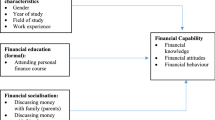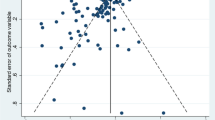Abstract
Anecdotal evidence points to a potential causal link between growing student debt and lower homeownership after the global financial crisis. Our research suggests that while student debt may have reduced the rate of homeownership, it has not been the central cause of the decline. Student loans can indeed represent a big financial strain on some individuals and households. However, at the macroeconomic level, the impact on homeownership appears only transitory and adverse growth effects of higher student repayments appear to have been small thus far. Any financial stability concerns are mitigated by government ownership of most student loan default risk.

PP is percentage point. Source: Current Population Survey 2005 and 2014 (authors’ calculations)

Source: TransUnion, LLC and National Student Clearinghouse.

Sources: College Board, Annual Survey of Colleges; NCES, IPEDS Fall Enrollment Data

Source: College Board “Trends in Student Aid”
Similar content being viewed by others
Notes
We define “at risk” borrowers as student loan borrowers who are either subprime or distressed (i.e., those who are 90 or more days past due on their loans).
References
Feiveson, Laura, Alvaro Mezza, and Kamila Sommer. 2018. Student Loan Debt and Aggregate Consumption Growth. Board of Governors of the Federal Reserve System, Feds Notes. https://www.federalreserve.gov/econres/notes/feds-notes/student-loan-debt-and-aggregate-consumption-growth-20180221.htm.
Mezza, Alvaro A., Daniel R. Ringo, Shane M. Sherlund, and Kamila Sommer. 2020a. Student Loans and Homeownership. Journal of Labor Economics 38(1): 215–260.
Mezza, Alvaro A., Daniel R. Ringo, and Kamila Sommer. 2020b. Student Loans, Access to Credit and Consumer Financial Behavior. Working Paper.
Mezza, Alvaro, Kamila Sommer, and Shane Sherlund. 2014. Student Loans and Homeownership Trends. Board of Governors of the Federal Reserve System, Feds Notes. https://www.federalreserve.gov/econresdata/notes/feds-notes/2014/student-loans-and-homeownership-trends-20141015.html.
Author information
Authors and Affiliations
Corresponding author
Additional information
Publisher's Note
Springer Nature remains neutral with regard to jurisdictional claims in published maps and institutional affiliations.
Based on a presentation made at the session Assessing and Addressing the Student Loan Overhang at the NABE Economic Policy Conference, February 25, 2020. The analysis and conclusions contained in this note are those of the author and do not necessarily reflect the views of the Board of Governors of the Federal Reserve System, its members, or its staff.
Rights and permissions
About this article
Cite this article
Sommer, K. Student debt overhang: imprint on homeownership and the economy. Bus Econ 55, 134–137 (2020). https://doi.org/10.1057/s11369-020-00181-5
Published:
Issue Date:
DOI: https://doi.org/10.1057/s11369-020-00181-5




